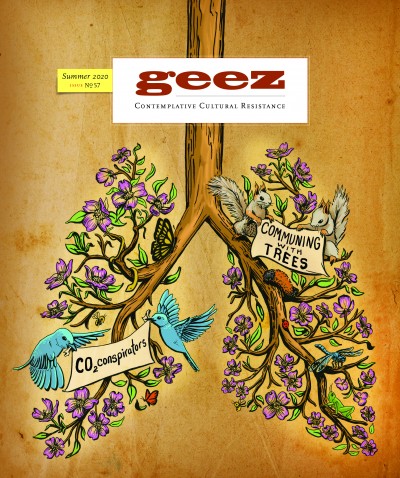Book Review: The Cross and the Lynching Tree

Petra Zantingh, “Hospitality Tree (Zechariah 3:10),” 2018, water based media on wood panel, 24 x 24 inches, Private collection.
Rev. Dr. Martin Luther King, Jr. famously clarified that a law cannot make a man love him, but it can keep a man from lynching him.
King knew that it would take both a change of heart and a change of policy to create a world no longer built on what he called “the giant triplets of evil”: racism, materialism, and militarism. White Christians have long obsessed over the heart. One major theological underpinning of this trend is an abstract, sentimental interpretation of the death of Jesus that sidesteps the giant triplets by spiritualizing and futurizing salvation. While Black folks are catching hell on earth, white Christians counterfeit the cross by turning it into a VIP pass to heaven.
In The Cross and the Lynching Tree (Orbis Books 2011), Dr. James Cone de-atones the crucifixion of Jesus for white America. Cone saves the cross by re-contextualizing it. He excoriates white Christian pastors and professors for their failure to connect the death of Jesus to the history of lynchings of Black Americans. “The cross and the lynching tree,” Cone wrote, “interpret each other.” The cross needs the lynching tree to remind us of the reality of suffering. The lynching tree needs the cross to amplify hope. However, it is impossible to comprehend both the brutality and the beauty of the cross “unless one is standing in solidarity with those who are powerless.”
Cone animates this work with biblical scholarship, theological engagement, and African-American history, but the glue that binds it all together is his own experience in both the South and the seminary – both segregated. Cone laments the way his own education trained him to segregate theology from ethics. He candidly calls out “integration” as “tokenism.” He dedicates thirty pages to Reinhold Niebuhr – a brilliant scholar who was limited, according to Cone, because he was unfamiliar with radical Black perspectives. This is not an objective or neutral theological work. As a result, it is an exquisite experiment with truth.
The Cross and the Lynching Tree indirectly laments the flag-waving faith of white Evangelicals and conservative Catholics striving to make America great again. More importantly, it challenges the walking-on-eggshells faith of white liberals who cultivate what Brené Brown calls “common enemy intimacy.” They vocally blast Trump, but struggle to vulnerably confess complicity with King’s giant triplets of evil – the disease for which Trump is a flaring symptom. The theological focus of white Christians – both on the right and the left – is tragically pixilated. Cone writes:
Until we can see the cross and the lynching tree together, until we can identify Christ with a “recrucified” black body hanging from a lynching tree, there can be no genuine understanding of Christian identity in America, and no deliverance from the brutal legacy of slavery and white supremacy.
Interpretations breed implications. When the death of Jesus is read through the lens of a Black lynching, then “we are called to more than contemplation and adoration.” We are forced to address the scandal. The Cross and the Lynching Tree refuses to press cancel on Christianity. Instead it composts our flag-waving and walking-on-eggshells faith narratives into a whistle-blowing adventure rooted in solidarity with the crucified people of the world. This text galvanizes us to dismantle the giant triplets of evil. Both in our hearts and in our world.



Start the Discussion